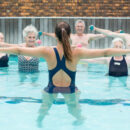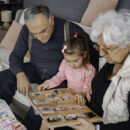Eleven Signs It Might Be Time for Assisted Living
As we age, our needs and abilities age with us, changing in certain ways. Sometimes, these changes mean we need a little extra help. Assisted living can provide the support needed to maintain a high quality of life. But how do you know when it's time to consider this option? Here are eleven signs that it might be time for assisted living.

Understanding Assisted Living
Assisted living is a form of housing designed for individuals who need assistance with daily activities such as bathing, dressing, and medication management. Unlike a nursing home, which provides a higher level of medical care, assisted living offers a balance of support and independence, allowing residents to thrive in a respectful and dignified environment.
Sign 1: Difficulty in Managing Daily Life Tasks
Activities of Daily Living (ADLs) are tasks we perform every day, such as eating, bathing, and dressing. If you or your loved one is struggling with these tasks, it might be time to consider assisted living. Difficulty managing ADLs can be a sign of declining physical or cognitive health, and assisted living communities like Koelsch Communities are equipped to provide the necessary support. For example, if your loved one is having trouble bathing or dressing, the staff at an assisted living community can provide assistance while still respecting their privacy and dignity.
Sign 2: Frequent Memory Lapses
Memory lapses can be a normal part of aging, but when they become frequent or severe, they can indicate a more serious problem like dementia or Alzheimer’s disease. If your loved one is frequently getting lost in familiar surroundings or forgetting important information, assisted living can provide a safe and supportive environment for them. Memory care programs, like those offered at Koelsch Communities, are specifically designed to support individuals with memory loss, providing structured routines and activities to help maintain cognitive function.
Sign 3: Multiple Hospitalizations
Frequent hospital visits or multiple hospitalizations in a short period can be a sign that living alone is no longer safe. Assisted living communities can provide the necessary supervision and care to prevent accidents and manage health conditions, reducing the need for hospital visits. For example, if your loved one has been hospitalized multiple times due to falls or health complications, the 24/7 care provided in an assisted living community can help prevent these incidents.
Sign 4: Chronic Loneliness
Loneliness can have serious effects on both physical and mental health. Assisted living communities offer social activities and companionship, helping to combat feelings of loneliness. At Koelsch Communities, we believe in creating an environment where residents can thrive socially, fostering a sense of community and belonging. Regular social activities and events can help residents stay connected and engaged, improving their overall well-being.
Sign 5: Behavioral Changes
Changes in behavior, such as increased agitation, confusion, or withdrawal, can be a sign of underlying health issues. Assisted living staff are trained to recognize and manage these changes, providing the necessary support and care. For instance, if your loved one has become increasingly agitated or withdrawn, the staff at an assisted living community can work with healthcare providers to determine the cause and develop a care plan to manage these changes.
Sign 6: Medication Mismanagement
Proper medication management is crucial for maintaining health, especially for individuals with chronic conditions. If your loved one is forgetting to take their medication or taking it incorrectly, assisted living can provide the necessary supervision to ensure medications are taken as prescribed. Medication management services at assisted living communities like Koelsch Communities can help ensure that residents take the right medication at the right time, reducing the risk of medication errors.
Sign 7: Frequent Falls
Falls can be dangerous, especially for older adults. Assisted living communities are designed with safety in mind, reducing the risk of falls and providing immediate assistance if a fall does occur. For example, if your loved one has had multiple falls, the safety features and 24/7 supervision at an assisted living community can help prevent future falls and provide immediate assistance if a fall does occur.
Sign 8: Poor Diet and Weight Loss
Maintaining a healthy diet can be challenging for older adults, especially if they live alone. Assisted living communities provide nutritious meals, ensuring residents get the nutrients they need. If your loved one is losing weight or eating poorly, assisted living can help. Dining services at Koelsch Communities offer a variety of healthy and delicious meal options, taking into account dietary needs and preferences.
Sign 9: Declining Health
Declining health is often a clear sign that it’s time for assisted living. If your loved one’s health is deteriorating, the support and care provided by an assisted living community can help improve their quality of life. For instance, if your loved one has a chronic condition like diabetes or a heart disease, the medical supervision and care coordination provided at an assisted living community can help manage their condition and improve their health.
Sign 10: Neglecting Personal Hygiene
Neglecting personal hygiene can be a sign that an individual is struggling with the tasks of daily living. If your loved one is having difficulty maintaining personal cleanliness, it might be time to consider assisted living. These communities provide support for daily personal hygiene tasks, allowing residents to maintain their dignity and independence. For example, if your loved one is not bathing regularly or neglecting dental hygiene, the staff at an assisted living community can provide assistance while still respecting their privacy and dignity.
Sign 11: Dementia
Dementia often makes living alone dangerous and difficult. Assisted living communities are equipped to provide the specialized care needed for individuals with dementia, ensuring they are safe and well-cared for. Memory care programs, like those offered at Koelsch Communities, provide structured routines and activities to help maintain cognitive function and manage the symptoms of dementia.
Choosing the Right Assisted Living Facility
Choosing the right assisted living community is a crucial decision. At Koelsch Communities, we understand the importance of this decision and are committed to providing the finest living experiences anywhere. Our communities are designed with the needs of our residents in mind, providing a supportive and respectful environment where they can thrive.
Final Thoughts
Recognizing the signs that it might be time for assisted living can be challenging, but it’s an important step in ensuring your loved one gets the care they need. At Koelsch Communities, we’re here to help every step of the way. We believe in valuing the individual, providing the finest living experiences, and treating each resident with the respect they deserve.
Why Choose Koelsch Communities for Assisted Living
With our history dating back to 1958, Koelsch Communities has been providing mom-approved care for over six decades. Our mission is to create happiness by providing the finest living experiences anywhere. We are committed to serving our residents with respect and special attention, crafting an environment where your loved ones can thrive. If you’re considering assisted living, we invite you to learn more about our communities and our approach to care.
Disclaimer: This article is for informational purposes only and does not constitute medical, legal, or financial advice. It’s recommended to consult with a medical, legal, or financial professional tax for your specific circumstances.









